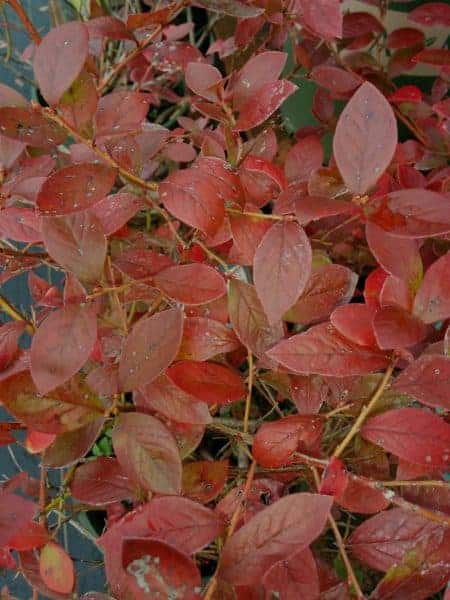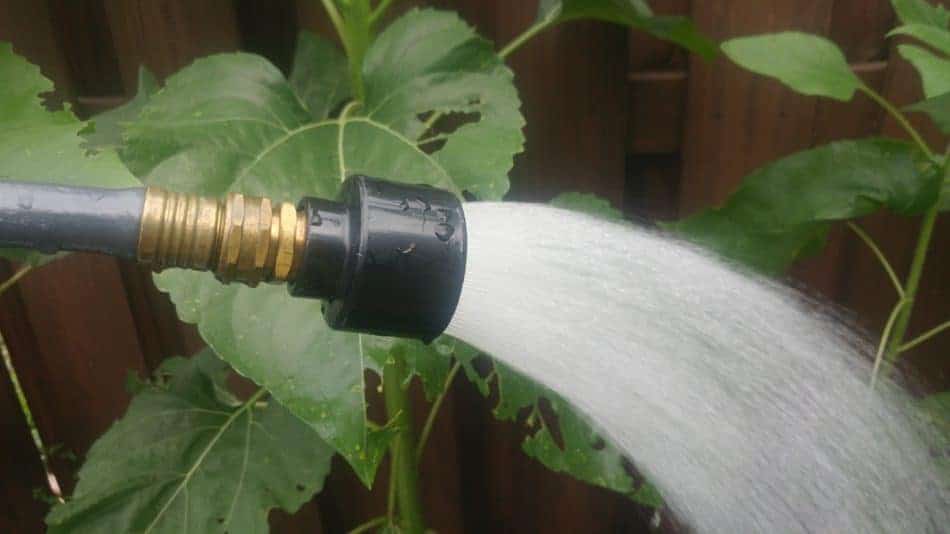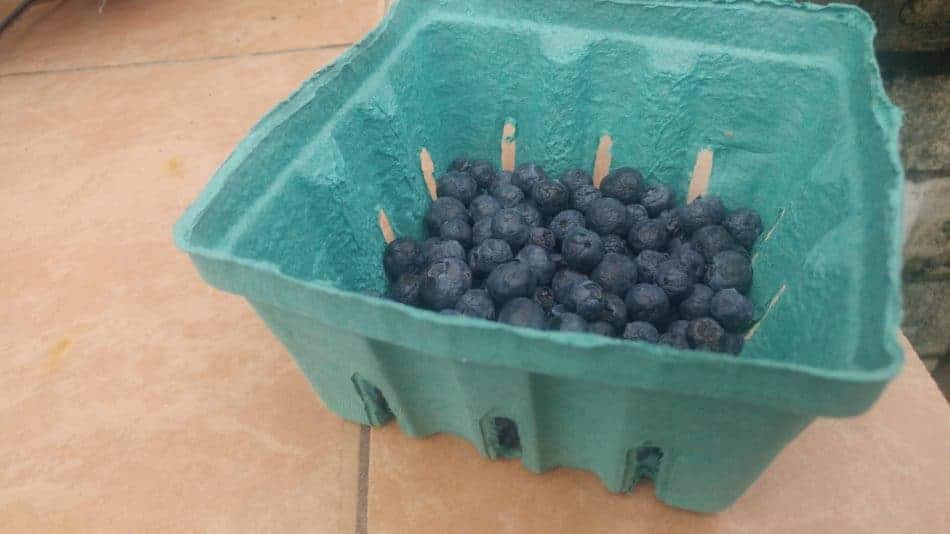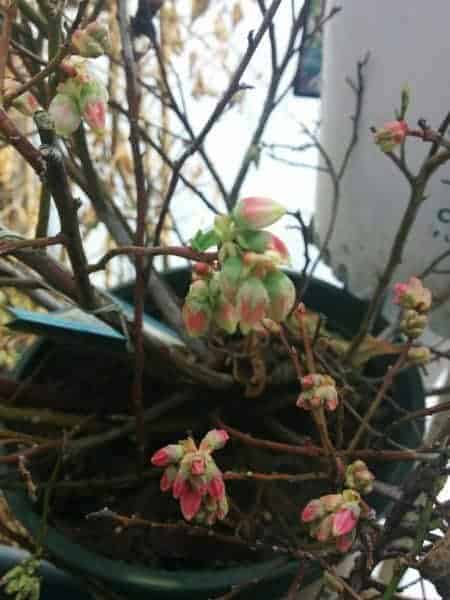Blueberries are great plants for much more than just your functional fruit and vegetable garden. Blueberries are THE rockstars of edible landscaping! I love to use them everywhere you would want a shrub.
This is the easy way to care for them through the winter to have the best harvest next season! Mmmm, I can just taste them now!
Winter Is Coming; Prepare Your Blueberries for the Winter:

Raking and Removing Fallen Leaves From Your Blueberries:
These leaves will harbor insect eggs and fungal disease spores waiting to overrun your blueberries next year. Get them raked up and either removed from the property or burned. I do not prefer not to compost these, however, if you choose to compost them, do so only in a very hot compost pile, at least 140 deg F. If you are not using a soil thermometer to compost with, you can assume your pile is not hot enough. For your shade trees (unless you see reasons not to, like disease or insect problems), please do compost the leaves! But your fruits, just remove, that is an easy first step in preventing problems.



Click on the pictures for Amazon’s Best Price!
Check the Soil pH of Blueberries:
Do a quick pH test to check the acidity level of your soil. Blueberries prefer a pH of 4.0 to 5.3.
“Sulfur also can be applied after planting to the soil surface but not mixed with the soil. Rates of up to 7/10 (of a)pound per 100 square feet can be used yearly, if needed. If the initial soil pH is above 6.0, growing blueberries will be difficult unless massive amounts of peat moss or milled pine bark are mixed with the soil. Use 1 pound (2.5 cups) per 100 square feet on sandy soils to lower pH by 1 unit (for instance, from 6.0 to 5.0). Apply 2 pounds per 100 square feet for the same amount of pH lowering on heavier soils containing silt, clay or more than 2 percent organic matter.”
Elina Coneva, Auburn University
Soil chemistry is continually trying to re-adjust itself to its original state, and so does the pH.
If you needed to lower the pH for your blueberries when you planted, it is not a one-and-done action.
You will need to keep an eye on the pH every year and adjust when necessary to keep your blueberries thriving!
Do stay away from Aluminum Sulfate as the aluminum can build up in your soil. I recommend using one of the three pH adjustment agents below. Pelletized sulfur, or liquid sulfur, or Espoma’s Soil Acidifier. The liquid is faster and easier to apply, but remember, when any product is water-soluble, it will also be soluble by rainwater and wash out of your soil quickly.
Mulch Your Blueberries Before Winter:
Prepare your blueberry shrubs for winter with a thick layer of plant-based mulch. Pine needle straw, bark mulch, chopped straw, any organic mulch you are using around your yard. By organic, I mean, it used to be living and the mulch breaks down into the soil over time, not organic in the reference of free of chemicals and is OMRI listed. Same word, different definition, but I digress.

Water Blueberries Regularly and Deeply Throughout the Fall and Early Winter:
Pay special attention to watering your blueberries deeply, so the water penetrates about 18” down into the soil; even after the leaves have dropped.
Use a moisture meter if you are unsure when you have watered enough.
The last watering will be when the ground freezes, get that last soaking in just before the first deep freeze. This will be the last drink your blueberry shrubs might have until spring.
Remember, the sun and wind are still working to dry out your bush above ground. Be sure it has enough reserves to last the winter.
When the ground is frozen, so is the available water, and can not be accessed by your plant.
Winter Is Here, What To Do During the Winter Months:
Prevent Deer, Rabbit & Mice Damage On Blueberries:
If You Have Light Critter Browsing Pressure:
- Hang scented soap, Irish Spring seems to be the most effective. Have some fun, make them part of your holiday decor!
- Spray lower stems with garlic or hot pepper spray. Be careful with hot pepper sprays, you do not want to get the wind blowing back into your eyes or hands. Wear gloves and eye protection!
- Plant lavender, or put cut lavender branches as a mulch around the base of the plant.
If You Have Strong Critter Browsing:
- Use a commercial strength deer repellant, these are the ones I use and have had good luck with. Rotate repellants when you have strong critter pressure, as any repellant becomes less effective over time, and another will be needed.
- Use plastic tree wraps, if your bush allows it, to encompass the main trunk. You will need to cut the tree wrap into shorter sections, or if your blueberry bush is very young, or twiggy, wrap it with a flexible wire mesh around the area at ground level as best you can.
If You Have Extreme Critter Browsing:
- All Of The Above, PLUS
- Wrap deer fencing/bird netting completely around your individual plants
- Install deer fencing around the entire garden
- Use a thicker gauge mesh wire for your trunk wrap collars to prevent rodent damage to your bush.
- Hold a continual, loud, active party every night, all winter, to scare the critters away (just checking if you are still reading!).
To Prevent Sunscald on Blueberries:
If your blueberry plants are young and tender, and you do not expect a heavy and consistent snow cover, you can paint the trunk with white latex paint diluted with water 50/50.
Heavy Snow & Ice Storm Protection:
Usually, blueberry bushes are not bothered by deep snow or small ice storms. Do not plant where snow piles will be pushed (it will feel like a glacier to the plant!). Heavy storms might break branches on very large and mature blueberry bushes. Either check after a storm and prune back any damage or stake up large branches to help support that extra weight. However, this is not a common problem.
Pruning Blueberries:
Blueberries can be pruned after completely dormant. Pruning promotes growth, so do not prune after Mid-Summer, as it will spur new growth that will be soft and easily damaged during the winter. Prune mid-winter to early spring, before buds even start to break open.
“Felcos are my go-to pruners. hands down. When I was counting pennies to buy groceries I saved up to buy a pair (they are so much more affordable now) and are worth every penny! The pruning cuts are easy on your hands, ‘like budda’ Nothing compares!”
-Toni Colgrove, BesideTheFrontDoor
Fertilizing Blueberries in Winter:
Do not fertilize your blueberries during the winter. It may not cause any damage, it is just not effective this time of year and the time and money would be wasted. Do not fertilize after late summer, as fertilizing then would promote soft growth that is susceptible to damage, insects, and disease. When you do fertilize in the spring and summer, use a fertilizer labelled for acid-loving plants (often labelled for azaleas, or hollies).
Winter Care When Blueberries are Under the Eaves.



Click on the pictures for Amazon’s Best Price!
If your blueberries are unfortunately under the eaves of your house, protect them from rain and snow loads coming off your roof with hard coverings.
For the above flat-topped arbor you can put a piece of lattice cut to size on the top to aid in protection.
Under the eaves is a very difficult place for any plant to survive with the increased intensity of rain and snow off of the roof. There is a reason why normally, this area under the eaves does not grow anything, the conditions are not hospitable. Mitigate the intensity of the water and snow off your roof with the photo suggestions above.
At the first opportunity, transplant. Fall is best, spring is the second best time to do this.
Blueberries Planted Next To Walkways:
When blueberries are planted next to walk or driveways, damage from winter salt is a problem. Alternatives to rocksalt that are gentler to plants (and pets too!) are calcium chloride, magnesium chloride, potassium chloride, or calcium magnesium acetate.
Be careful of damage from snow blowers and shovels as well.

Blueberries Planted in Areas the Are Wet In the Spring:
Blueberries do not like to be submerged in water (unlike cranberries) if the spot they are planted in is very wet in the spring, this is a good time to transplant them to a more ideal area for them to grow. Fall is best, spring is the second-best time to transplant.
Winter Pest Spraying of Blueberries:
“Dormant oil or superior oil helps control scales, mites, and other overwintering insects. Use lime-sulfur for suppression of fungal diseases, such as rust on roses or cane blights on blueberries and raspberries.”
Dr. Leonard Perry, Extension Professor, University of Vermont
Winter and early spring is a great time to spray dormant, superior oil, and lime sulfur. Do not spray both of these within a week of each other. Additionally, when temperatures are below 40 deg F or will be below in 24 hours, or if the temperature will be above 70 deg F do not spray these.
Both of these are best used only if you are expecting certain insect or disease problems because you battled them the previous season, or see insect eggs on your bushes. Otherwise, there is no reason to spray.

With a little planning to head off potential problems, you too can be enjoying blueberries right off your own bushes! Enjoy!
https://extension.unh.edu/resources/files/Resource000578_Rep600.pdf
https://extension.unh.edu/resources/files/resource001686_rep2265.pdf
https://fruitgrowersnews.com/news/dormant-sprays-for-disease-control-in-blueberries/
Lime sulfur sprays can improve spring disease control – MSU Extension
Soil pH for Blueberry Plantings – blueberries (extension.org)
Applying Dormant Sprays and Other April Gardening Tips (uvm.edu)
..”

